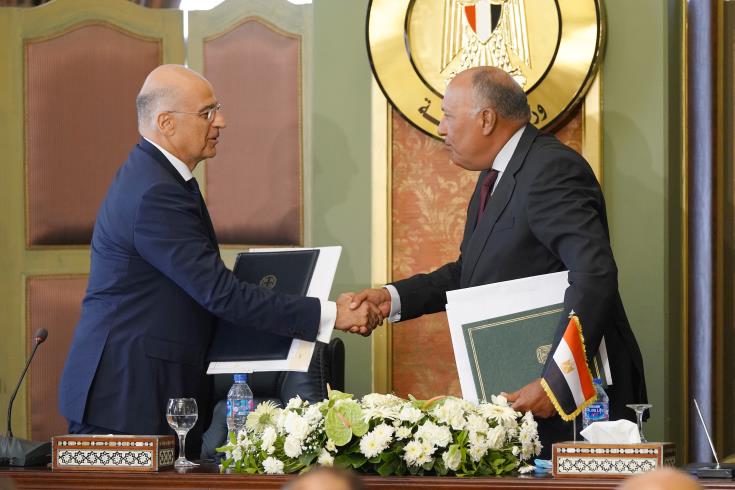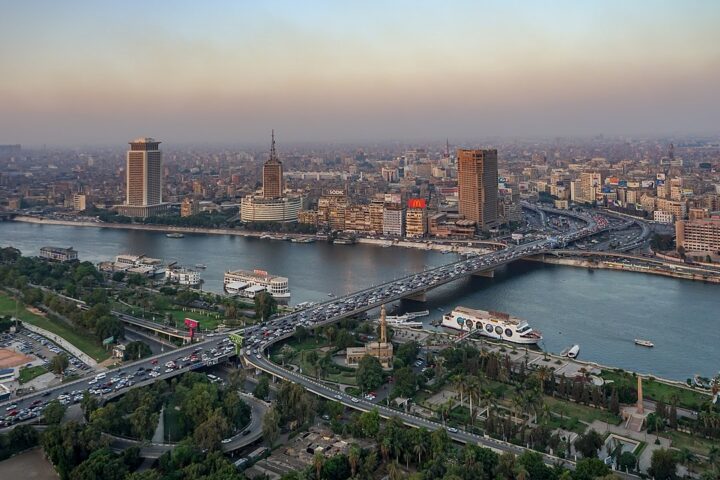The East Med geopolitical constellation keeps changing almost daily.
Greece and Egypt signed a maritime agreement to establish the exclusive economic zone (EEZ) of the two countries.
Egyptian Minister of Foreign Affairs Sameh Shoukry announced it after meeting his Greek counterpart Nikos Dendias in Cairo.
Both sides have agreed on the EEZ in the eastern Mediterranean, an area containing promising oil and gas reserves.
Dendias reiterated that the agreement with Egypt is within the framework of international law, respects all concepts of international law of the sea and good neighbourly relations.
Dendias also stated that it contributes to security and stability in the region.
The latter remark needs to be seen in the light of the ongoing geopolitical and military confrontation between Turkey and the members of the so-called East Mediterranean Gas Forum.
Cairo and Athens are at odds with Ankara, not only based on Turkey’s aggressive offshore moves, which include the use of Turkish naval and air forces in an around the Greek islands and Cyprus but also linked to the signing of a maritime delimitation agreement with the UN-recognized Libyan government.
For all EMFG members, the Turkish-Libyan EEZ agreement is seen as an attack on their offshore gas reserve operations by Turkey.
In the last couple of months, the conflict around offshore gas in the East Med has nearly led several times to direct military confrontation but not yet a real clash.
The Turkish-Libyan EEZ agreement, which includes Greek and Egyptian maritime areas, has been condemned by not only Egypt, Greece, Cyprus, and Israel but also the EU.
At the same time of the Shoukry-Dendias talks, Egyptian Minister of Petroleum, Tarek El-Molla, and Cyprus’s Minister of Energy, Natasa Pilides, have discussed plans to boost cooperation in the fields of oil and gas, especially in the Eastern Mediterranean.
The two also reiterated the need to convert the EMFG into an intergovernmental organization.
The current move by Athens and Cairo is a reaction to the Turkish-Libyan moves, but also due to increased aggression by Turkish seismic survey vessels in the eastern Mediterranean.
Cairo has already directly warned Ankara that any move further will involve a confrontation with Egyptian armed forces.
In the background, the whole crisis is also linked to Turkish president Erdogan’s growing support for the Libyan Tripoli-based GNA government, threatening to start a military attack on the Sirte oil region.
Egypt, Greece, supported by France and the UAE, back east Libyan general Haftar’s LNA army and militias.
Cairo has openly stated that any Turkish-GNA military operations on Sirte will be met by Egyptian military counteractions.
Most of Turkey’s military support and weapons for the Tripoli – GNA government groups needs to be brought in by ships, hence the importance of the new EEZ agreement.
Clear lines are now drawn by the East Med partners to counter further Turkish actions in the area.
Turkey’s ire
The Turkish reaction was as expected.
A statement by Ankara’s Ministry of Foreign Affairs said the Greece-Egypt EEZ agreement is “null and void” for Turkey.
Ankara also reiterated its claim that the demarcated area is located on Turkey’s continental shelf, as reported to the UN.
Turkey clearly will not allow any activity in these areas and will continue to resolutely defend its legitimate rights and interests in the Eastern Mediterranean, as well as those of ‘Northern Cyprus’, Turkish officials report.
Turkish Minister of Foreign Affairs Mevlüt Çavuşoğlu is expected soon in Libya.
The Turkish minister will go to Libya from Malta with his Maltese counterpart Evarist Bartolo.
In Libya, they will talk about a joint cooperation agenda.
Libya in North Africa and the Mediterranean island of Malta are separated by only about 357 kilometres.
The EU is again involved, as Çavuşoğlu will also meet EU foreign policy chief Josep Borrell in Malta.
This bi-tri-lateral meeting will be focusing on the Turkey-EU futures.
Brussels is in a corner, as the EU’s official position is still reasonably positive towards Ankara while a growing list of member states wants sanctions against Turkey being put in place.
The aggressive moves by Ankara, its continuing threat of flooding the EU with refugees and its military adventures in Libya, Syria and even the Caucasus, are seen as a threat to European security.
In the coming weeks, EU officials will show their true position, as the East Med again, even after a short thaw due to Germany-brokered Athens-Ankara negotiations, is heating up.
The Egyptian-Greek EEZ move was expected and will be supported.
Turkish moves will be scrutinized.
The danger of a new confrontation, however, is there as Turkey again has issued a new NAVSINT indicating new seismic and naval operations around Greek islands.
It seems that EMFG members are taking their future in their own hands.
Greece, Egypt, France and increasingly Israel, are inclined to move from an energy-based EMFG approach towards a formal economic and military organization.
Brussels, and NATO, should become involved, showing strength and willingness to confront the destabilization actor.
If not, the region needs to resolve the issue by itself.










